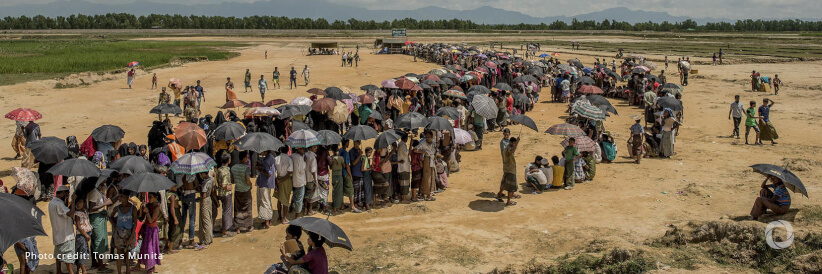Visiting Rohingya settlements, Caritas Internationalis General Secretary Alistair Dutton thanked the Bangladesh government for its robust and ongoing support for Rohingya refugee families and called on the global community to do more.
“I am profoundly moved by the hospitality and enduring support that the Bangladesh government has shown for Rohingya refugees for the past seven years,” says Dutton. “While the attention of the world has moved on, the Rohingya people continue to struggle in these forgotten camps. But the Bangladesh Government can’t be expected to support them alone. Other countries need to step up with more funding for this crisis.”
In Cox’s Bazar, Dutton met with government, UN, and NGO officials, while in Dhaka he met the Archbishop of Dhaka and the Ambassador of the Vatican. Dutton also spoke with staff and the Forcibly Displaced Myanmar Nationals (FDMNs) in the camps to discuss the current situation and challenges.
“We must not forget the Rohingya people — or take the support of the Bangladesh government for granted,” Dutton said. “Rohingya families are among the most vulnerable people in our world today, living on marginal land, without the right to work. Teenagers have now spent half of their life in these settlements. We must do more to ensure their safety now and their options for the future.”
Since the refugee crisis began in 2017, funding has dropped dramatically. The global funds supporting the refugees’ food have been reduced to $11 per person per month while funding for other sectors has fallen much more significantly and inflation has been about 300%. The living conditions are also deteriorating, as the settlements’ shelter, water, and sanitation facilities require repair and maintenance. For children, their education and protection have deteriorated severely.
In 2024 the Joint Response Plan for the Rohingya Humanitarian Crisis has been launched under the leadership of the Bangladeshi authorities. With a goal to raise $852.4 million, the plan will support 1.35 million people in Rohingya and host communities with safe shelter, education, water and sanitation, medical care, mental health assistance, and livelihoods and infrastructure projects. However, with funding last year only reaching 65% of the response plan, conditions are set to deteriorate substantially.
Between 2017-2023, Caritas has provided $45 million in emergency efforts for Rohingya and host community members in Cox’s Bazar and Bhasanchar. During this time Caritas has been responding to the Rohingya refugee crisis and has assisted nearly 1,7M individuals to date with comprehensive assistance, including shelter support, protection, Disaster Risk Reduction activities, education and water, sanitation, and hygiene. Caritas has committed to provide an additional $7 million in support for 2024.
“Over the past six years, more than 200,000 children have been born in the camps. They have never seen their home country and have no nationality,” says Dutton. “They are stateless. This response requires renewed international attention and equitable burden-sharing by countries in the region and beyond, together with pressure on Myanmar for safe and dignified return of the Rohingya with their rights restored.”
The Secretary-General’s visit reflects Pope Francis’ recent renewed appeals to the Rohingyas, highlighting the suffering of the refugees. Pope Francis met a group of Rohingya during his visit to Bangladesh in 2017.
Dutton’s visit started in Dhaka, with a visit to a Drop-In Center for children in Arambag, where Caritas Bangladesh has been supporting street children. In Mirpur, he also visited the Rojonigondha Slum to meet with families involved in disaster risk reduction efforts.
“I will be leaving Bangladesh deeply inspired by the humanity, compassion, and solidarity that the Bangladesh government Caritas Bangladesh, and local communities have shown for Rohingya families, who need our attention, resources, love, and prayers more than ever. Let’s collectively meet this call for humanity,” says Dutton.
The Secretary-General has also stressed the important work Caritas Bangladesh has done for many years to help people in need during the cyclone season every year.
This year, Cyclone Remal, which hit the country in May, affected more than 105,000 individuals. Caritas Bangladesh staff and volunteers have been working with the community to prepare shelters and distribute food, first aid boxes, and hygiene kits.

